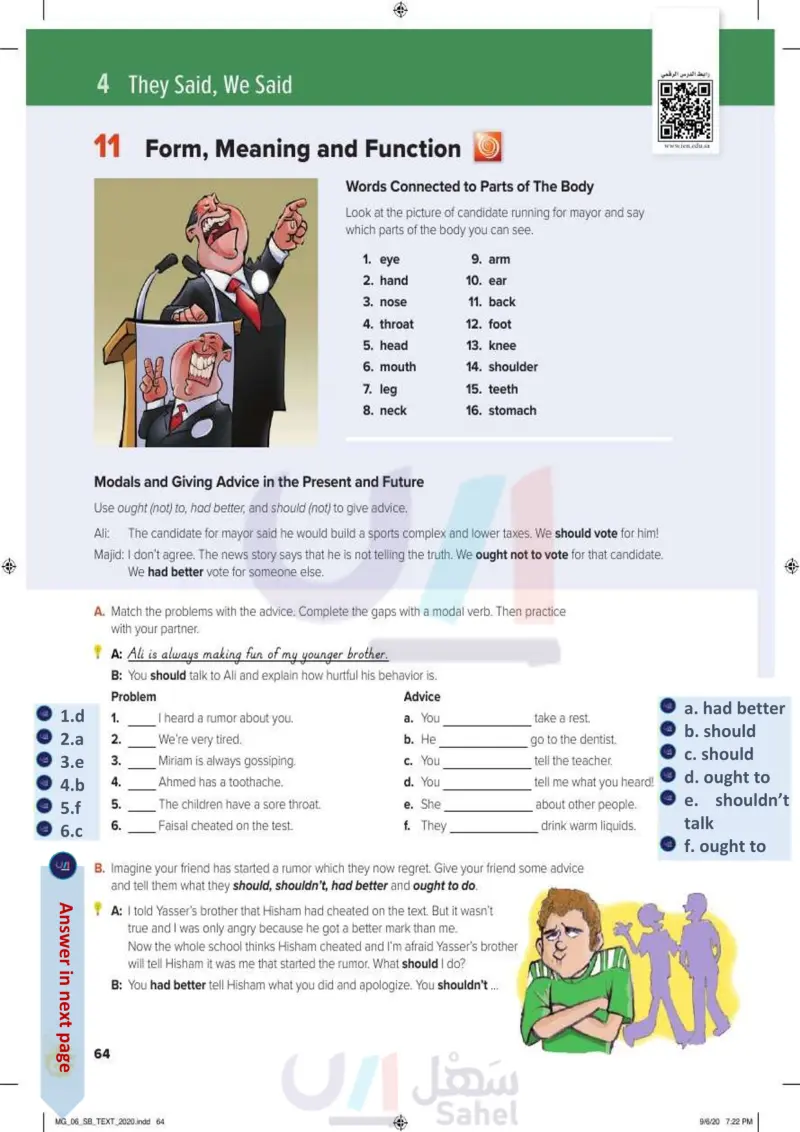Form Meaning and Function - Mega goal 3 - ثالث ثانوي
Term 1
Unit1: Two Is Better Than One
Unit2: influential people
Unit3: What Will They Think of Next
Unit4: The World of TV
Term 2
Unit5: Do You Really Need It
Unit6: The Gender Divide
unit7: Everyone Makes Mistakes
unit8: Against the Odds
Term 3
unit9: Beauty Is Only Skin Deep
unit10: They Said, We Said
unit11: Express Yourself
unit12: Lost and Found
O 10 They Said, We Said 11 Form, Meaning and Function Words Connected to Parts of The Body رابط الدرس الرقمي www.ien.edu.sa Look at the picture of the candidate running for mayor and say which parts of the body you can see. 1. eye 9. arm 2. hand 10. ear 3. nose 11. back 4. throat 12. foot 5. head 13. knee 6. mouth 14. shoulder 7. leg 8. neck 15. teeth 16. stomach Modals and Giving Advice in the Present and Future Use ought (not) to, had better, and should (not) to give advice. Ali: The candidate for mayor said he would build a sports complex and lower taxes. We should vote for him! Majid: I don't agree. The news story says that he is not telling the truth. We ought not to vote for that candidate. We had better vote for someone else. A. Match the problems with the advice. Complete the gaps with a modal verb. Then practice with your partner. A: Ali is always making fun of my younger brother. B: You should talk to Ali and explain how hurtful his behavior is. Problem Advice 1. I heard a rumor about you. a. You take a rest. 2. We're very tired. b. He go to the dentist. 3. Aisha is always gossiping. c. You tell the teacher. 4. Ahmed has a toothache. d. You tell me what you heard! ف في 5. The children have a sore throat. e. She Faisal cheated on the test. f. They about other people. drink warm liquids. B. Imagine your friend has started a rumor which they now regret. Give your friend some advice and tell them what they should, shouldn't, had better and ought to do. A: I told Yasser's brother that Hisham had cheated on the text. But it wasn't true and I was only angry because he got a better mark than me. Now the whole school thinks Hisham cheated and I'm afraid Yasser's brother will tell Hisham it was me that started the rumor. What should I do? B: You had better tell Hisham what you did and apologize. You shouldn't ... وزارة التعليم Ministry of62ation 2024-1446 MG_03_COMBO_TEXT_2024.indb 162 30/4/24 3:07 AM

Words Connected to Parts of The Body
Modals and Giving Advice in the Present and Future
Complete the gaps with a modal verb. Then practice with your partner 1. I heard a rumor about you
imagine your friend has started a rumor which they now regret. Give your friend some advice and tell them what they should, shouldn't, had better and ought to do
O Modals Auxiliaries for the Present and Future Ability Use can and be able to to express ability in the present. Can you keep a secret Is he able to discover who started the rumor? Yes I can. / No, I can't. Yes, he is. No, he isn't. Use can and will be able to to express ability in the future. Will you be able to speak to the principal? Can you find out who started that rumor? Permission Use may and can to express permission. May I leave early today? Can I have another soda? Requests Yes, I will. No, I won't. Yes, I can. / No, I can't. Yes, you may. / No, you may not. Yes, you can. / No, you can't. Use can and could to make polite requests. Could is more formal. Could I have the check, please? Can I speak with you Possibility Yes, of course. / Certainly. Sure. Not now. I'm busy. Use may, might, and could to talk about possibility. Use can't to talk about impossibility. Do you think he might give away the secret? Obligation and Necessity He can't tell. He doesn't know anything. Use must, need to and have to to express obligation and necessity. Use should to give advice. You must stop gossiping. You must not spread rumors. You should talk about events and not about people! You shouldn't tell anyone what you know. Note: Must is stronger than should. It has a more formal or official tone. C. Circle the correct verb to complete each sentence. If both verbs are possible, circle both. 1. My grandmother said that we (should/ might) call her this week. 2. The teacher told us we (may / could) have a test this week. 3. Ali said after he passes his test, he (can / will be able to drive his father's car. 4. The news reporter said the missing helicopter (can/ could) be in the Atlantic Ocean. 5. The teacher explained that students (have to / shouldn't) gossip about other students. 6. Faisal and Omar said they (may / might) play football later. We (ought to / must not) go and play, too. 7. My brother said he (may / might) go to Dubai on vacation this year. 8. That (can't / must) be the man we saw yesterday. The man we saw was much taller. 9. My father has to work late today and so he (won't be able to / can't) join us for dinner. 10. Excuse me, (can / need to) you help me find the accounts department? وزارة التعليم Ministry of Education 2024-1446 MG_03_COMBO_TEXT_2024.indb 163 163 30/4/24 3:07 AM

Modals Auxiliaries for the Present and Future
Circle the correct verb to complete each sentence. If both verbs are possible crcle both 1 My grandmother said that we (should/might) call her this week











